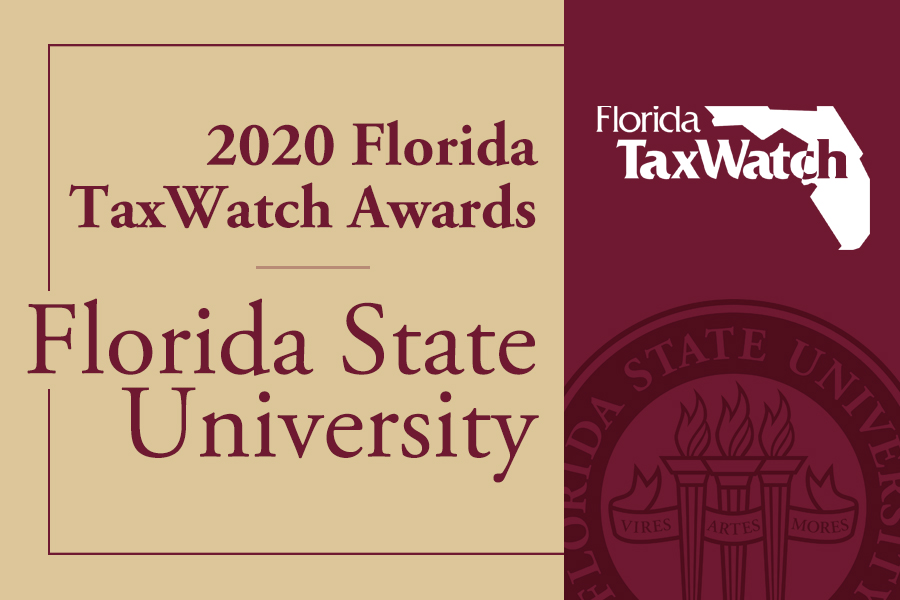
For the fifth consecutive year, Florida State University employees claimed a total of 14 Florida TaxWatch Productivity Awards, the most by any institution in the State University System.
The Florida TaxWatch Productivity Awards recognize and reward state employees and workgroups who find ways to improve services, increase efficiencies and save Florida taxpayers millions of dollars each year.
Within the past year, FSU has identified cost savings and cost avoidance that affect the entire campus. The 14 FSU programs recognized save students, families and taxpayers more than an estimated $86 million annually.
Winners will be honored for their award-winning solutions and productivity improvements for the state government during a virtual awards ceremony Tuesday, Dec. 15. FSU’s winners are listed below, along with their projected tax savings.
This year, Florida State University received three of Florida TaxWatch’s top productivity Cash Awards:
Maintenance Systems

Mauro Mancilla, maintenance systems engineer
James Stephens, executive director of Campus Utilities and Maintenance
Chad Cooper, assistant director of maintenance
Jerry Alexander, assistant director of maintenance
Estimated Cost Savings: $90,000
By analyzing data and the movement of Facilities Maintenance staff on campus, the team developed and implemented a process that combined six maintenance service zones into four, eliminated two full-time supervisor positions and reduced the amount of transit time to and from work assignments.
By consolidating shop workspace, some are now co-located within the maintenance service zone, eliminating the need for larger, on-road vehicles to commute between jobs and the parts required to complete them. It has allowed for the replacement of many larger vehicles with smaller service vehicles. It also can now service most of the main campus with dedicated electric vehicles, contributing to further sustainability. Electric vehicles now represent 5 percent of the maintenance fleet vehicles but are expected to grow to 50 percent within five years.
Central Utilities & Engineering Services

Nariman Nusserwanji, energy engineer
Estimated Cost Savings: $95,000
The Electrical Demand Response System automatically gathers data from existing equipment in an innovative way to dramatically increase the amount of energy data that can be extracted from a building. The data is used to drive both energy consumption and electric demand cost savings. From an operational standpoint, the system will save $95,000 per year in purchased electricity. The savings are a combination of electric demand savings during peak temperature days and decreased energy usage during low occupancy.
Learning Systems Institute/FCR-STEM
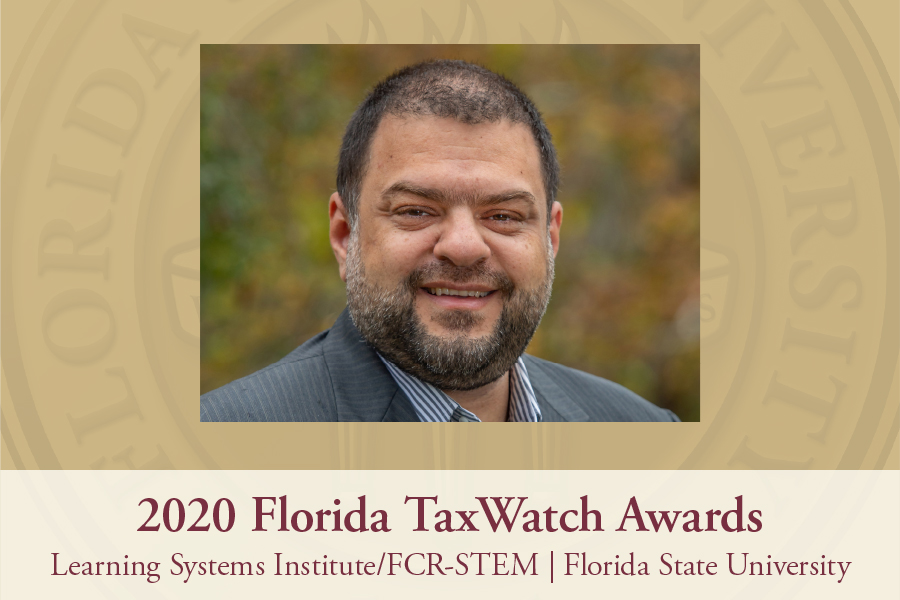
Rabieh Razzouk, director of the Florida Center for Research in STEM
Estimated Cost Savings: $40,000,000
Research indicates that scientific experimentation tools and manipulatives for high-quality, hands-on learning in K-12 schools are limited and expensive, making them inaccessible to most STEM teachers. In partnership with Sciberus Inc., a software and curriculum solution was designed called MyStemKits, for K-12 teachers to cheaply create high-quality manipulatives for hands-on math and science teaching using 3D printing. While not related, the 3D printers from the Learning Factory and many of those placed in schools are creating face shields for health care workers around Florida to help fight against the COVID-19 virus.
Florida State also was recognized in the Agency Initiative award category, which honors teams of more than five employees for across-the-board excellence:
Institute for Family Violence Studies
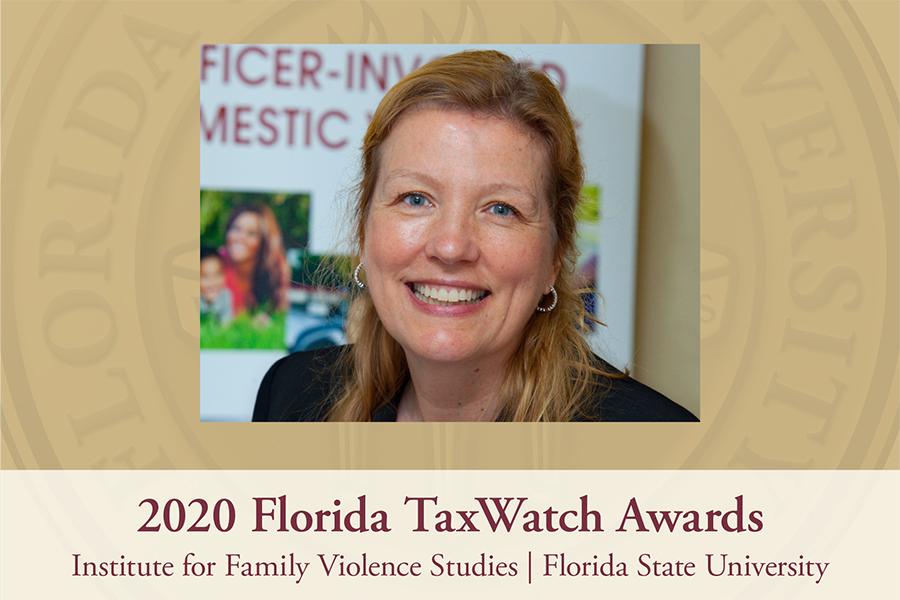
Karen Oehme, director
Estimated Cost Savings: $300,000
To promote Florida’s goal of being “trauma-informed,” FSU’s Institute for Family Violence Studies created an online, multidisciplinary curriculum. This curriculum enables professionals worldwide to develop the knowledge and skills needed to understand the developmental impact of trauma on clients and patients while providing the keys to resilience.
The agency developed a 20-hour, 10-chapter curriculum of evidence-based readings, case scenarios, video lectures and other multimedia materials, assignments and quizzes. It provides a new perspective on trauma-informed approaches to improve service delivery to clients, students, human services recipients, patients and other public members. Continuing education credit has been approved for licensed counselors, therapists, social workers, nurses, teachers, chaplains, lawyers, judges and others.
Florida State University also earned 10 Plaque Awards:
Finance & Administration, Department of Procurement Services

Casey Laurienzo, contract administrator
Megan O’Malley, contract and policy analyst
Estimated Cost Savings: $15,000,000
FSU’s Office of Procurement Services recently implemented a centralized Contract Administration Program. The program has updated university policies and procedures, launched an automated contract routing system and initiated campus-wide training on contracting best practices. The program mitigates risk, ensures compliance and creates a consistent and efficient workflow for the routing, approval, signature and management of contracts university wide. This allows greater transparency and efficiency, in addition to the opportunity for cost savings and cooperative purchasing.
Graduate Health Subsidy
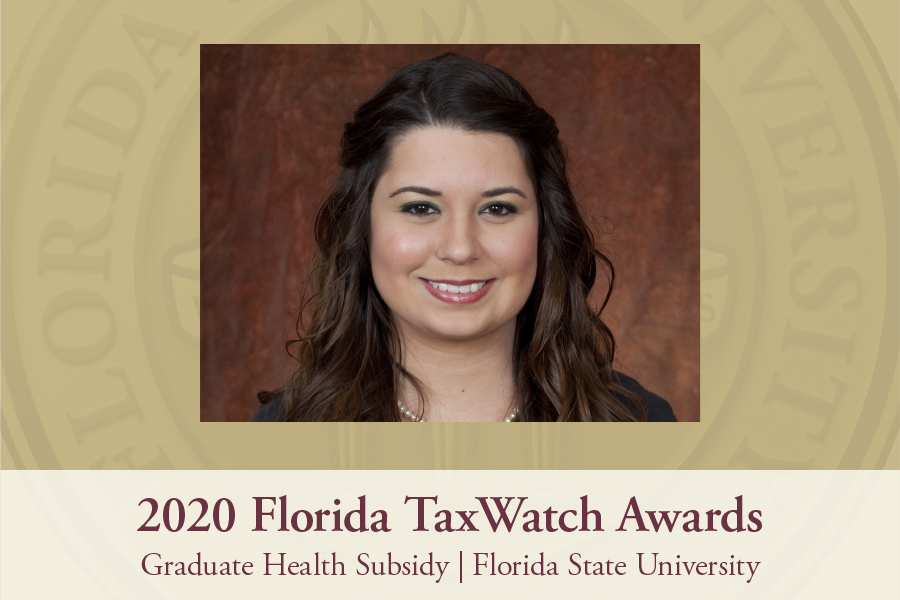
Ashley Jarvis, deputy director for business operations
Brian Barton, associate dean for business operations
Derek Blauer, assistant controller, operations
Linda Lieblong, associate director, benefits
Beverly Miller, associate controller
Estimated Cost Savings: $17,700
The Graduate Health Subsidy team worked to streamline the exception payment process for students who missed the election window. Originally, this payment was processed as a bonus and paid directly to students via payroll, causing the student to lose roughly 28% of the total amount due to taxes. The new method allows the university to process the payment as the health benefit it truly is, allowing it to be processed through the Benefits Office and applied directly to the student health insurance charge. This allows the student to take full advantage of the benefit other students receive throughout the semester.
College of Social Work

Karen Oehme, director of the Institute for Family Violence Studies
Ann Perko, director of Policy & Special Projects
Lyndi Bradley, program manager
Estimated Cost Savings: $40,000
The team created a new Trauma and Resilience Training module for the Successful Co-Parenting After Divorce Project. This module expands the free toolkit, available 24/7 online, provided by and required by the State of Florida for divorcing parents. The new module informs parents of the potential long term, negative physical and mental health consequences resulting from their childhood trauma history. It provides the tools to address and break the cycle of family dysfunctionality. The training supports successful co-parenting after divorce by helping parents gain insight into their behavior and teaching stress management and resilience skills to stop the cycle of adversity for their children. It is the only free tool available for divorcing parents in Florida that satisfies divorce education mandates and to date has served 2,171 Floridians.
Center for the Advancement of Teaching

Leslie Richardson, director
Jennifer Bartman, associate director
Sophia Rahming, associate director
Joe O’Shea, assistant provost and dean of FSU Undergraduate Studies
Estimated Cost Savings: $29,294,000
Through FSU’s Course Redesign Initiative, the team facilitated redesigning the structure and delivery of key courses, particularly within the STEM discipline, to maximize student learning and success, especially for those first in their families to attend college, benefiting a total of 7,542 students in the first year. By dramatically improving course passage rates, the equivalent of 775 students who previously would not have passed these required courses completed them — instead of retaking courses, lengthening their time in college or dropping out altogether.
To help faculty redesign courses to be more learner-centered, CAT planned and facilitated course design seminars, provided ongoing support through one-on-one consultations, and piloted a Learning Assistants Program. Through this, faculty could work with advanced undergraduates trained to help facilitate active learning during class time. The changes in the Calculus I classes were particularly noteworthy. Previously, female students had passed the course at lower rates than men, DFW’s rate (students receiving D or F grades or withdrawing) dropped by 13 percent. This means that more women can pursue majors (e.g., engineering) that require calculus as a prerequisite, thanks to the initiative. In all the redesigned courses, DFW rates for underrepresented students dropped. The initiative will provide the state with more diverse and better-prepared STEM graduates for many years to come.
Office of Institutional Research
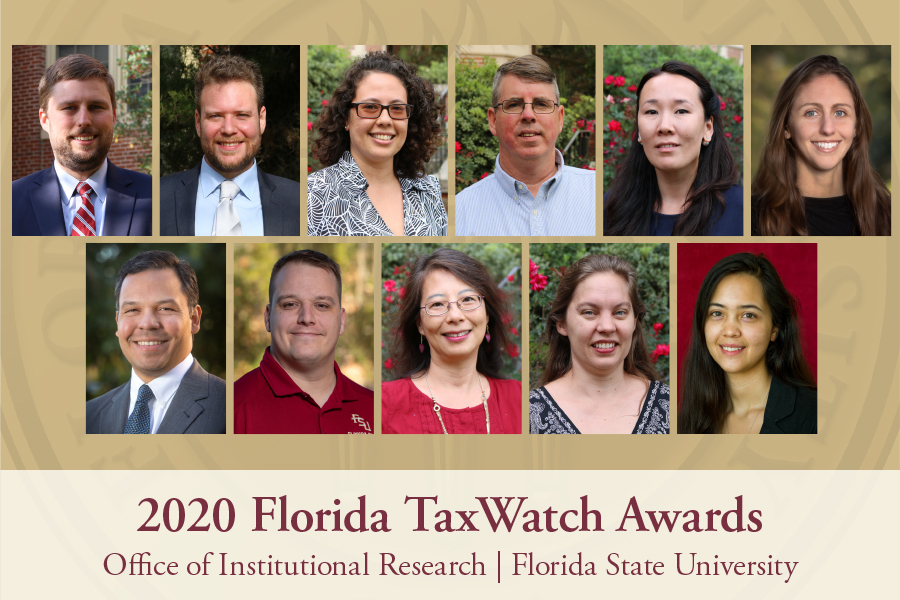
James Hunt, director of Institutional Research
Matthew Earhart, director of Information Management
Heather Epstein-Diaz, compliance reporting analyst
Andrew Brady, associate director of Institutional Research
Galiya Tabulda, director of Institutional Planning and Assessment
Lauren Goulet, student success analyst
Zachary Stoffers, faculty data analyst
Eugenio Hernandez, statistical business analyst
Joling Emerick, senior business analyst
Mev Verzaal, FACET manager
Samantha Nix, assistant director of institutional research
Estimated Cost Savings: $478,400
As a result of extensive comparison research, Institutional Research (IR) replaced the previously used platform, Tableau, with Microsoft’s Power BI, at a 90 percent cost savings. Authorized users can now access and manipulate their data instead of requiring all visualizations to be curated and distributed by IR. By widely deploying Power BI, IR guided two primary innovations at the University: First, analyses and data visualizations are more interactive than before, allowing new approaches addressing various important issues with colleagues, most notably in student success. Second, with access to Power BI, campus partners can immediately visualize and analyze their data independent of IR, allowing for more efficient and effective collaborations in later phases of work with IR. Multiple annual reports and data models moved from Excel and paper copies to standardized data reports and visualizations shared and manipulated through an internet browser. It has expedited functions and processes performed by campus units that regularly receive new/updated data and reports.
Computing Technology Support

Alex Morales, associate director of IT
Jason Penley, IT manager
Gage Bevis, IT support specialist
Nick Chau, IT support specialist
Will Atkins, IT Support Specialist
Estimated Cost Savings: $1,115,000
University computers were frequently found to be running outdated software, thereby creating security risks. The team implemented a software patching service to consolidate and automate deployment and installation of common-use software updates to university-owned computers, including those used in classrooms and computer labs. This service significantly reduces man-hours previously required to update computers. Additionally, and perhaps more importantly, this service significantly decreases the deployment and installation time required to ensure computers are reliable and secure. Overall, this achievement consolidates a good portion of the roles and responsibilities of various IT operational units across campus into a single unit for consistency, reliability, efficiency and compliance with internal IT security policies and industry best practices.
Information Technology Services

Gerardo Garcia, director of Application Development Services
Derek Dean, assistant director
Estimated Cost Savings: $20,000
FSU ITS developed an internal COOP (Continuity of Operations) Application that cuts the cost of thousands of dollars to the university instead of purchasing a COOP solution, roughly $15,000 per year. FSUPD was looking for a way to notify the campus quickly when seconds matter. FSU ITS quickly developed an API to communicate with Everbridge, an emergency communication services company. When FSU Police Dispatch Center clicks a button, the Emergency alert system is activated. It sends emergency messages to the FSU community via email, text, social media, web posting, sirens, desktop notifications, etc., within seconds.
International Programs

Louisa Blenman, associate director
Chuck Stratton, IT manager
Dustin Lynch, program manager, Admissions
Michelle O’Brien, communications coordinator
Estimated Cost Savings: $19,400
International Programs designed and developed the Student Portal, a student-focused interface that houses pre-departure tasks students must complete before studying abroad. This new software integrated and consolidated a wide variety of departmental business processes that were once completed in-person or on paper into an easy-to-use online system. The team embarked on this multi-year project to centralize and streamline internal business processes, eliminate redundancy and increase student accessibility to the program information and communications. After a thorough review of the current business process, International Programs designed, built and implemented a custom software solution that simplified the application, admission and pre-departure processes for study abroad students and staff.
College of Medicine
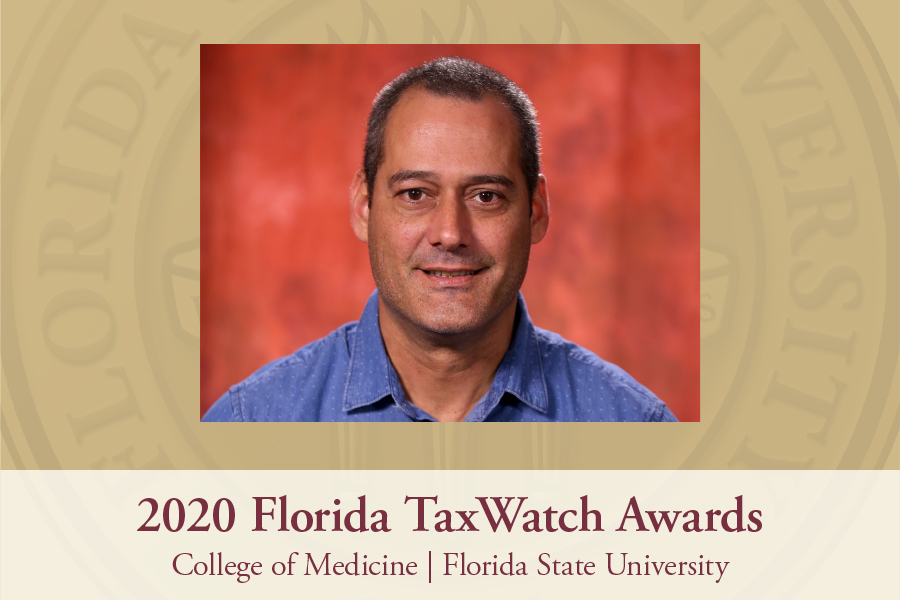
Andres Castaneda, database administrator
Estimated Cost Savings: Increased efficiency
Students apply to medical school through a national organization called the Association of American Medical Colleges (AAMC). The FSU College of Medicine receives thousands of applications from the AAMC each year, each of which must be transferred into internal databases and into the greater university’s student application database. This process is of crucial importance to the college in reviewing applicants and enrolling students.
College of Law Juris Master Program

Manuel Utset Jr., associate dean
Laura Sellati, director
Courtney Allen, program specialist
Mary Ann Montague, assistant
Susan Bowers, advisor
Estimated Cost Savings: $9,315
The Juris Masters Team at Florida State University increased enrollment in the online Juris Master degree program by 49 percent by implementing a streamlined admissions process and enhanced applicant support, growing the number of students enrolled in the program from 166 to 247 between Spring 2019 and Spring 2020. These graduates, who will be trained in complying with complex industry regulations effectively and efficiently, can save state agencies and private companies significant expense. The new admissions process, which is implemented for Spring 2020 applications, saves students $115 each due to no application fee and is supported by in-house staff.
Application information for the 2021 Florida TaxWatch Productivity Awards competition will be announced to the university community as soon as it is received from Florida TaxWatch.
For more information, visit the Florida TaxWatch Productivity Awards website or contact the HR Office of Training and Organizational Development at hr-ppacoordinator@fsu.edu.




